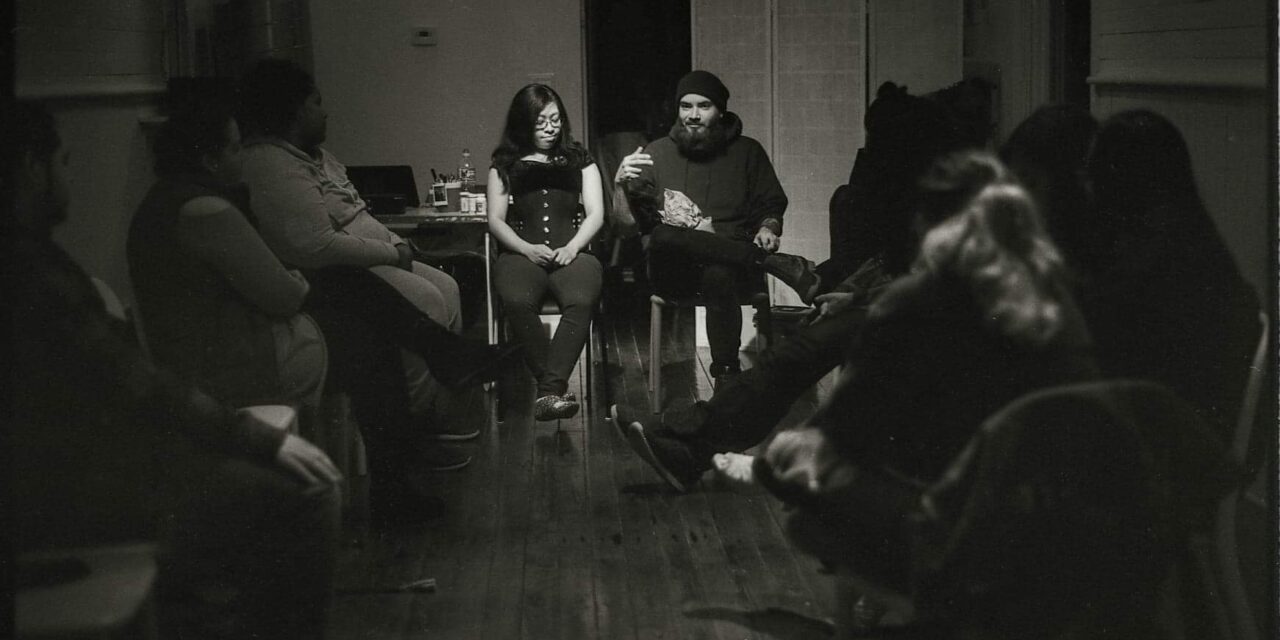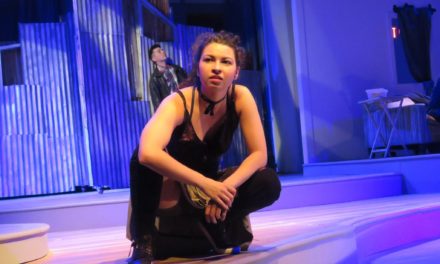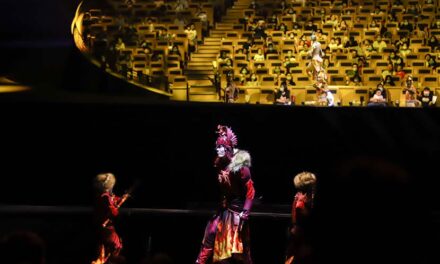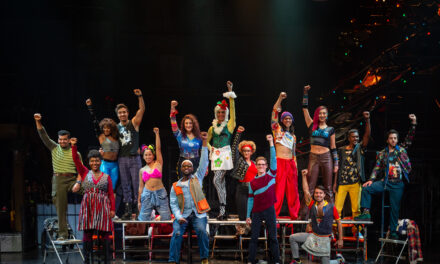Amanda Levie is the founder and director of No Peeking Theatre, Jersey City-based theatre company, who developed the idea at Art House Production that takes away the aspect of sight to create an equal and new approach to theatre. Levie aims to reachability equality in the experience of theatre, inspired by her own experience of feeling limited.
Madeline Engelsman: What inspired you to start No Peeking Theatre?
Amanda Levie: “This idea was created from a lot of psychological limitations, or the psychological effect of having limitations when I was getting my degree. When I looked at the resources that were available to people with disabilities, I found a serious problem with people sort of patting themselves on the back and also a problem with actually serving the community they were meant to serve. There was a big disparity of treatment and experience, like designated seating, added services, having to show up earlier to the show, and even just going to theatre in general […] So in practical use, ADA regulations were not really serving the community. On top of that, it wasn’t creating the same experience because maybe you could meet the cast or do a walkthrough of the stage, but that doesn’t allow you to pursue entertainment the same way the rest of us do…We don’t have to ask somebody for designated seating, we don’t have to ask somebody for a headset ahead of time, we don’t have to ask anyone if they printed braille playbills, we don’t have to do that. I felt the community wasn’t being served in the right way.” Levie added, “At the time I was a lighting design major, which is kind of the opposite of what I do now. I fired myself. I decided that maybe what we needed to do was change the structure of theatre by taking away something and maybe that would broaden the audience that we serve. So that’s where I came up with No Peeking. I came up with it in my senior year of college, it was my presentation for my degree and it did very well. It had a very positive effect on the faculty and staff. And I was not very well-liked in that department and school, so if everyone hated me and the idea was getting praise, I felt like I had something. I just decided that I wanted to keep pursuing that. But I realized that what I was internalizing when I was trying to create access for people with disabilities, was this feeling of being limited. The reason I took theatre administration was because I was rejected from the directing program three semesters in a row. …I just felt outed a lot. And a lot of that has to do with the general whitewashing of what theatre is. I was one of maybe three Hispanic girls, there were maybe two to four other people of color in a two hundred person theatre department. So feeling like a stranger or feeling limited or frustrated with the current arrangement was how I figured out I was sort of trying to empathize with that through ADA regulations, or at least that was the facet of which I was fueled to really pursue this. So that made me feel like what we needed to do was create access through every facet you possibly could. So all of our shows are original works. … most of them have to do with different perspectives that are also educational. Most of the writers for our theatre have been people of color or members of other marginalized groups. So we are trying to give volume to voices that are not normally heard and to tell the stories that are not normally told in theatre…And it’s interesting because there are all these other facets we don’t explore. As theatre people, we are always discussing how theatre is dying, and maybe that’s because its no secret we have been serving the white old rich population, as far as donors go, and they are also dying. But the idea is to take the dip downwards on the chin real quick and start building up something new. Start building up toward including people, start building up toward broadening the spectrum of what a good story is. People of color, myself included, we have a lot of them, we have great ones.”
ME: Coming from a design background, what encouraged you to start directing?
AL: “Actually there was a specific moment in which my boyfriend at the time had applied to directing, and I had also applied to directing. I applied early, he applied super late. I had been trying for three semesters, he was just going to give it a go. And he got in immediately. I was rejected and then he was accepted after I was rejected. So it was extremely insulting, I can’t tell you how many times I cried. I do remember just being so into it, that my boyfriend at the time would ask me about scenes, we would talk about his homework. He would ask, “How would you indicate that its cold outside?” …So we would talk about those things and eventually he had to do some final scenes for his final project. And I remember going into one of his rehearsals and taking notes. I took the notes, gave him the notes, and the very next day they premiered and he took every single note. He took every single note and everyone was so proud of how amazing and how wonderful it was. And I essentially directed this. It was validating–it was disheartening obviously–but it was definitely validating in the idea that I know what I am doing. I know I have something to build or grow. But no one here is going to build it for me, no one here is going to grow it for me, nobody even wants me to grow, they are hoping I wither and go away, that’s it. There were times that I begged for help and I couldn’t get it. And there were so many times of which I was set up to fail and it was somehow all completely my fault. Not only failing but also how I was failing–it was my fault. “If you were just a little nicer or well-liked, or if you were different, then maybe someone would have helped you and maybe you wouldn’t have failed.” But it seemed to me that there were plenty of difficult people to work with that were doing just fine. But I would say none of them were people of color.”
ME: With a focus on lighting early in your studies, how were you able to adjust to directing and utilizing other senses other than visual light?
AL: “My first year out of college I teamed up with a Jersey City-based venue called House Productions and we did developmental readings over the course of about a year and a half. So we basically brought in a sample audience, had them give me feedback, and there were things that stayed the same, scent scape and soundscape were concepts and design elements that have always been there, but there were other elements that were added because of that feedback [from the audience] like touch technician, in which there is an exhibit for people before the show to touch objects that are somehow related thematically or quite literally in the play they are about to experience.”

“Audience members are blindfolded for the duration of the show for a sensory and emotional experience.” -Amanda Levie. Photo by Joe Velez.
ME: How do you go about recruiting designers for the nonvisual senses?
AL: “Essentially I just wanted people who were passionate about something…So all I basically did was scout people for passion, stamina, and interest. And I haven’t been let down because the smell is a very easy one for people–everyone smells differently but everyone smells very strongly. … It’s not hard to get people into scent scape because it’s one of the talents we have that we don’t realize we have. And a lot of it is attached to memory and emotions–and everybody’s got those. So it’s not hard to tap into your intuition for that stuff. I think many of us have very hard lines that are very “this smells good, this smells bad-garbage smells bad, roses smell good, baby powder smells nice” We also have an idea of what triggers people’s emotions. Like bubble gum reminds me of my childhood, it reminds lots of people of their childhood and it triggers that kind of stuff. The good thing about all of this is that are aren’t really wrong answers. Because there isn’t a class, and there isn’t a resume that I am really looking at…The other thing is, I have found people who have been in jobs that are vaguely related to what they want to do. My first touch technician was originally a toy designer, she used to design toys for Target, and she is all about using her hands. She is in touch with the primal feelings of touching something and feeling something based on its shape or texture, or its temperature, over anything else. And my first scent-scaper used to work at Lush, so these roles don’t exist in any other place, but [these skills] are utilized in a lot of other places. So it’s not impossible to find someone that has relevant experience, they just don’t know it’s relevant yet.”
ME: How do you think losing the aspect of sight enables the audience to have individual experiences?
AL: “Because sight is taken away, lots of people create pictures in their minds, which is great. It is really a great tool for actors who just don’t look the part. In fact, it’s a better way to get great actors in general. Because people envision what they want to envision. And sometimes at the talkbacks, we realize people didn’t think this person would look this way, so it gives people who don’t necessarily have “the body type” or “the hair color” or “the weight” or “the height” or “the blue eyes” or whatever it is people are constantly searching for in aesthetics, that usually overrule talent in many places, a chance. It gives people with skill a real leg up, which is great. The other thing it does is allow you to use your imagination. And there is no disappointment because…whatever you’re thinking, you’re right. It also gets people to listen to content, in some of the purest ways. One of the things we do when we see people is we judge them, assume things about them, it happens…It doesn’t always mean [these judgments] are right. There are these assessments we make in our minds, and sometimes we don’t even know we are making them. So considering we are trying to give theatre to everybody, we are also trying to share perspectives with people that are different from them. As humans, we don’t like confrontation, but if you’re in a dark room alone, with this content, it makes it easier for you to hear this content. It makes it easier for you to ingest it. There is also a sense of vulnerability because you can’t see. This isn’t really an issue for people who are blind or have visual impairment, but for people that do see, and have these snap judgments and these assumptions, and ideas based on what they see, and then all of a sudden you take something away from them that they have always had… that they don’t necessarily consider a privilege, or something that is even present in their minds on a normal basis, if you take that away, they become more vulnerable and they hang on to everything you want, and everything you have to give them. If they don’t have anything to see, they want to listen to everything, they want to hear everything, they want to smell everything, they want to touch everything because they need to figure out how to reorient themselves. The other thing it does is create more autonomy. Everybody is getting the same experience. Someone who is blind that goes to a broadway theatre show that is very fantastically and spectacle oriented is never ever ever going to have the same experience as someone who is watching cinderella’s carriage turn into a pumpkin. That’s never going to happen. There’s something about that needs to change. So, there are other ways to tell stories; we have been telling stories forever. So the idea of creating the exact same experience for everybody is something we are trying to do by taking away sight and taking away spectacle. But it is also creating something very unique in every single audience member.”
ME: Are you planning on bringing your performances cross-country consistently?
AL: “We are going to come back to the West Coast. I am considering the Hollywood Fringe Festival. We also have an upcoming show in Philadelphia, we are doing the V. Lucas Cycle in Philly, in December. From December 20th to the 22nd, Friday to a Sunday. We are actually trying to increase the outreach of our repertoire or at least the footprint of it. Because most of these shows have only been seen in the span of maybe nine days at the most. But now that we have those [shows] it is time to get those out there and turn them out over and over again so our footprint becomes bigger. Our concern happened last winter, there was a theatre company that was almost exactly like mine. Down to the branding, looked very similar. Same blindfolds with the logo printed on the front, in a very similar font, also socially conscience message-oriented, nonprofit, just too many similarities. And they were actually based in Mexico, and they did their first show in LA the summer before [we did], and they did it at the Short and Sweet Festival. … We started in 2012, this place popped up in 2018. So I was like “oh no, what’s going to happen? Am I supposed to think they aren’t going to come to New York?” If they are shopping the festival circuit, there is no denying they are probably going to try to apply to New York Theatre Festivals. I needed to do something, I need to broaden our reach. I need to make our presence known, I need to make our accomplishments known, I need to challenge myself and do the most ambitious thing I can think of” and the thing I thought of was going to LA.”
ME: How was the experience going to LA? Was it challenging, do you feel it paid off? How did you feel the process went?
AL: “Everything was a learning experience. The show did well. I realized how much harder it was to do that, but I also found out how much help sort of surfaced, and I mean really ‘defining moment’ help when we had to take it to LA. It was also hard to fundraise for. Asking your demographic and people that support you for money to go spend on a show they will never go experience is a hard sell. “Hi, I’m Amanda, give me your money so I can go across the country and you will not understand why until after I am back, ok bye.” So that was a hard sell. But I was no stranger to saving up and working really really hard and going into mild credit card debt to make it all happen. And then sort of paid off that debt as I moved on to the next idea I had. But it did teach me a million lessons. I have a podcast called Artist Gripes, episode 11 and 12 literally tell you everything that happened on that journey because it was nuts.”
ME: When you went to Los Angeles did you bring your team and designers from New York or did you scout new designers in the Los Angeles area?
AL: “I actually used my home team. People that I knew and could work with because we were only in LA for a few days, so most of the work that needed to be done and developed needed to happen face to face, in small groups, demonstrating things, shopping scents, playing things over and over for me in the living room, testing out acoustics, testing out how mobile certain technology we were taking across country was-like does this fit in a carry-on? Does this fit in a checked bag? Are we just going to buy it when we get there? So I needed to have that conversation often with all of my designers. So because of that I just took them with me, but I only physically took one [to LA] and we sort of divided up the responsibilities and had an outline of how it was supposed to play out.”
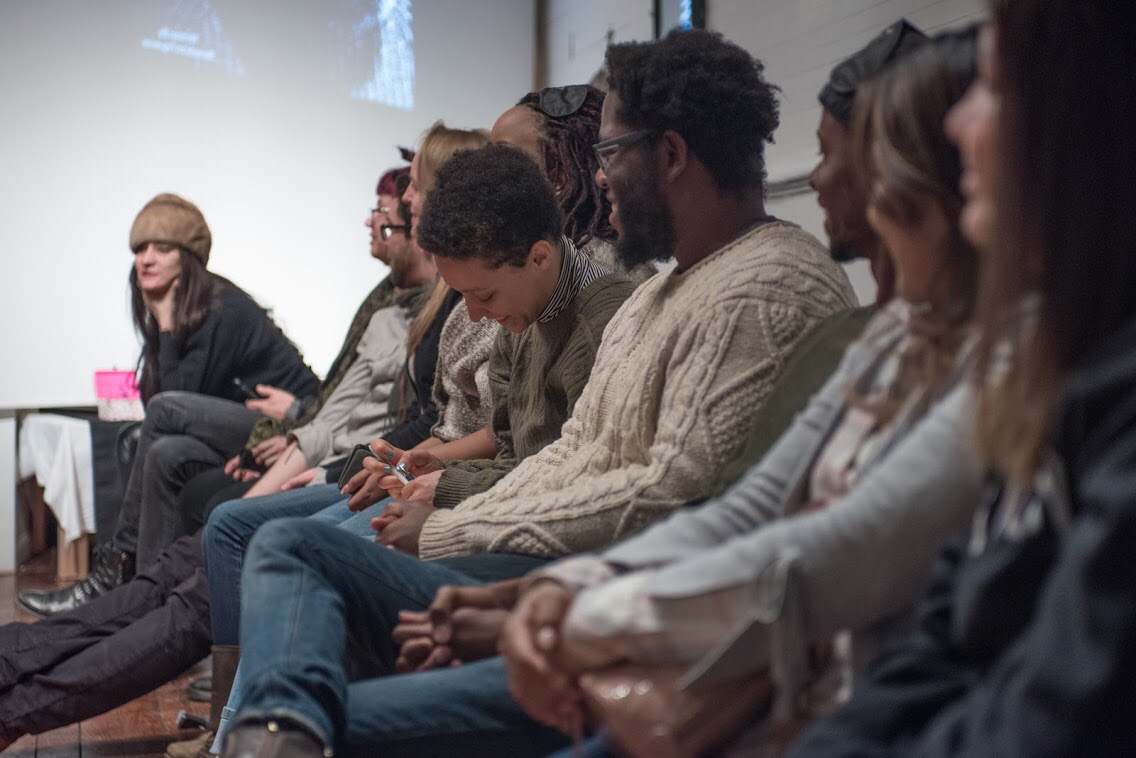
“We always talk about theatre dying and it seemed like it was the same stories from the same people. We decided to change that from the ground up. It was pretty natural that when we bolstered voices of color, that’s the demographic that showed up and showed out.” Amanda Levie. Photo by Joe Velez.
ME: Why do you think traditional theatre companies don’t utilize other senses other than sight and hearing?
AL: “I mean I think it has been. Theatre of Cruelty was very much like that, Artaud was really big on that, I had little glimmers of him and admirations for him while taking script analysis at the time, and I am not sure why people have gotten rid of it, but I know it’s been used and continues to be used in lots of things that are theatrical. They might not be in theatre like it took a while for Waitress to innovate something to be like someone baking apple pie at the show, you know. There are things that have been done intentionally for years, things that smell or look different, using them all the time. Abercrombie used to pump extra oxygen into their stores and turn down the lights. And that has a real effect. A physical and reactionary effect. Churches, with the idea of burning myrrh and frankincense and all of these other things it is a trademark. Having these large halls that are echoing all of the time, like they go on forever and ever. People having choir and music and ceremonies that are not just visually based but sensory-based. There are tons of things that go on, and I feel like just very recent experiences are back in, but they seem to be at a very high price.”
Amanda Levie plans on continuing her work and growing No Peeking Theatre’s reach. No Peeking Theatre is currently doing we have a show in Philadelphia and can also be seen at the upcoming NY Frigid Festival. Her important work to provide equality to those with disabilities, diversify the casting process, and tell stories that are not typically told, makes No Peeking Theatre a great example of the theatre industry’s push toward change and inclusion.
This post was written by the author in their personal capacity.The opinions expressed in this article are the author’s own and do not reflect the view of The Theatre Times, their staff or collaborators.
This post was written by Madeline Engelsman.
The views expressed here belong to the author and do not necessarily reflect our views and opinions.

